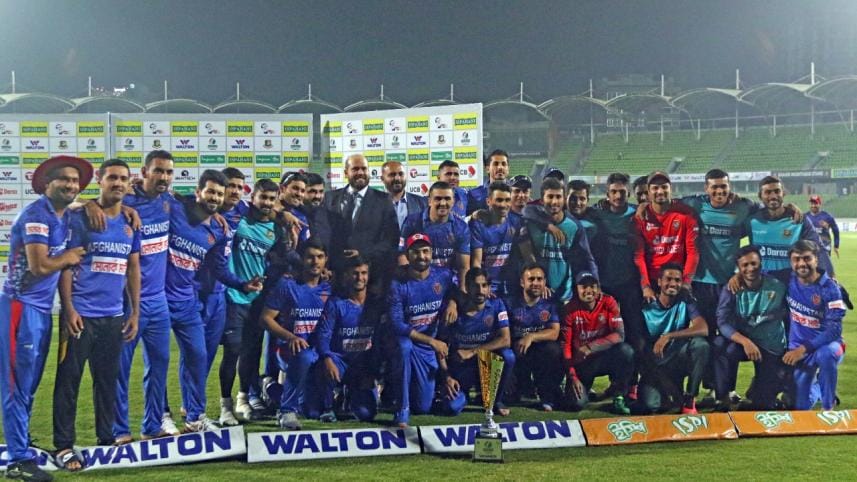Liton’s form the only difference in dissimilar results?

The results of the T20Is stood in stark contrast in terms of margins of victory after Afghanistan won the second T20I at Sher-e-Bangla national Stadium today to share the spoils with Bangladesh. Having won the first T20I by 61 runs, the Tigers' batting capitulated today in the face of some tight and accurate bowling from Fazalhaq Farooqi, Mohammad Nabi and Azmatullah Omarzai. But overall, in terms of Bangladesh's batting display in the two T20Is, Liton's 44-ball 60 was the only key difference in the margin of the results. The difference between 155 and 115 was Liton's form with the bat and it raises further questions about the rest of the side's batting effort this series. Leading up to the World Cup in Australia on the back of disappointing losses in the T20 World Cup, Tigers' think tank knows there is a lot of improvement to be made, but more importantly do they know what they are lacking?
The batting effort today largely appeared similar to the World Cup in UAE. The rut in the Powerplays continued. Catches are still being dropped while bowlers appeared to be the only area of positive in these T20Is at Mirpur, but then again that has been the case since the T20Is at home against Australia. While at the World Cup all batters appeared to be bamboozled by their own inability to time their shots, this series and the ODIs preceding it saw Liton in a great vein of form, comfortable in his confidence and capabilities.
Liton's ability to read Afghan spinners out of the hand was on display and given his overall flow, he found run-making natural in the first T20I. Despite that innings, Liton could not be altogether relinquished off his anchor duty and play his natural game. Instead, as has been the case in the shorter formats, when a top-order batter can stay on, he has to anchor the innings and Liton had to do the same. Even in the shortest format, Liton then had to also look to accelerate as others found it difficult to progress to a natural game plan.
Batting coach Jamie Siddons had suggested that they needed to have 'smart aggression' at the top. Once Liton fell early today, there was no one to provide that smart aggression at the top and pressure built up. The fifth over, when Liton departed, also brought two boundaries, Mohammad Naim hitting both but the next six overs overs (6 to 11) not a single boundary came as two more wickets were lost in Naim's and Shakib Al Hasan's. Only 17 runs came in those six overs. Having not picked up the scoring rate in the Powerplays, while also losing wickets does point to batters' inability to play to certain roles needed in a dynamic format such as T20s.
In the first T20I, there were two partnerships of 33 and 46 with Liton involved in both. Today Mushfiqur Rahim and Mahmudullah Riyad's partnerships could have been the game changer but once Mahmudullah fell, the Tigers succumbed to Farooqi.
Bangladesh had a different kind of plan for Afghanistan compared to ones against Australia and New Zealand. There was more in the pitch for the pacers and the wickets looked more sporting. Farooqi had been good all series and got it right on the money in the death overs as Bangladesh managed just 115, not having the big power-hitters left to do any damage late on.
Mahmudullah dictated at post-match ceremony that the pitch looked good but coach Russell Domingo contradicted him at the press conference that it was not easy to bat today. Afghan skipper Mohammad Nabi felt Bangladesh did not read the pitch.
"The pitch looks really good but I think the Bangladesh team also don't know much about that pitch. It's happening most of the time in Bangladesh. Once we realised that the wicket wasn't good for batting, we made plans to restrict them to a low total," he said today.
Liton had said after the first T20I that playing a 'high-risk' game could have seen them score more runs in the first T20I but such an approach could also lead to falling short of a good par score at Mirpur. Today they fell short of that par score by quite a margin, Domingo saying that 135-140 perhaps would have been a good total.
However, the key partnerships never developed, the skipper Mahmudullah himself departing at a crucial time in the game.
"You need 70-run partnerships. The boys just made some poor decisions at crucial times of the game. Riyad and Mushfiq got a good partnership going and then Riyad just got out. Those are mistakes you can't make against big teams," Domingo said at press conference today.
Overall there is a feeling that the batters were not being able to back themselves up to stay on and take advantage of momentum. In terms of mentality in the T20 format, there is an emphasis on smart aggressive cricket around the world. Consistency is an issue that the Tigers now must solve but without clarity of the roles that one would be asked to play in certain conditions, Bangladesh still have a long way to go. Ahead of the World Cup in Australia, there will be a lot of food for thought regarding matching T20 roles with batters capable of pulling them off. Answering such questions can go a long way towards adapting to challenges specific to building T20 innings and overall balance of the side.



 For all latest news, follow The Daily Star's Google News channel.
For all latest news, follow The Daily Star's Google News channel.
Comments